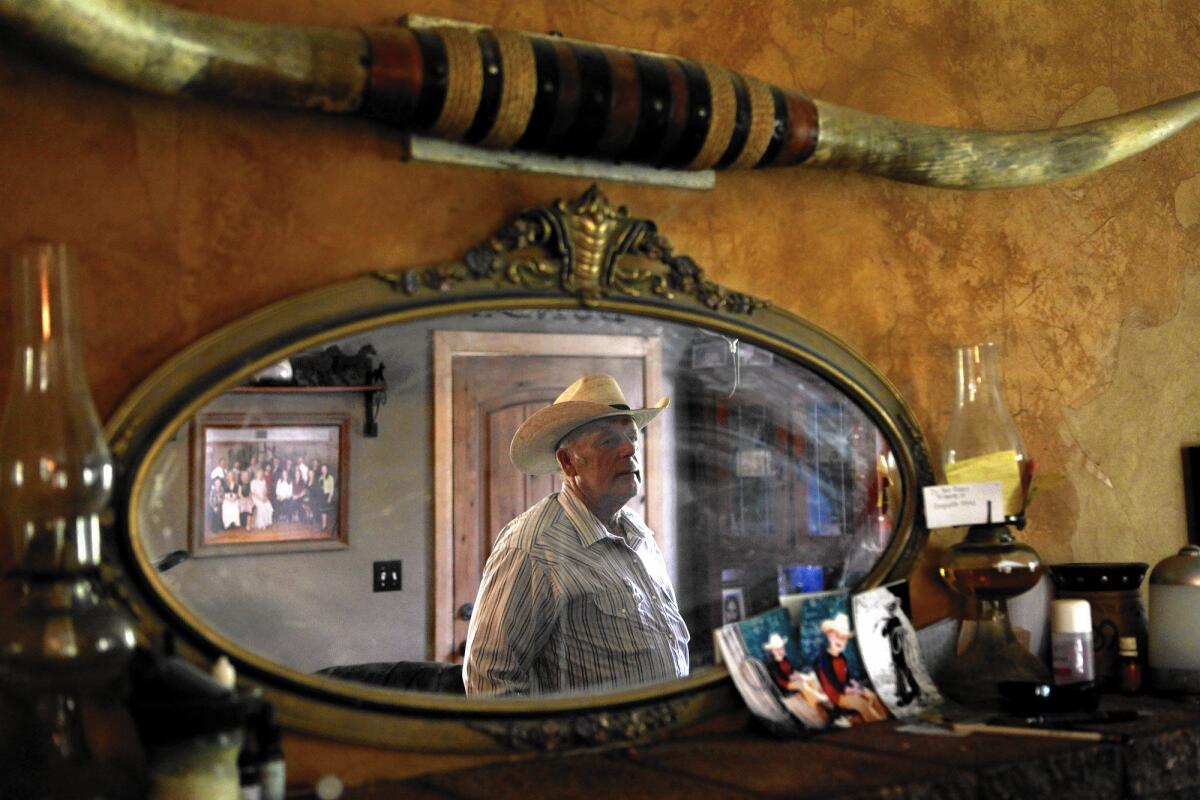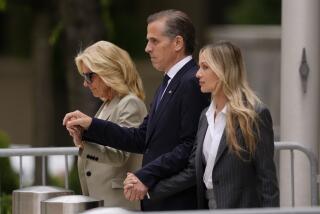Cliven Bundy’s ‘bizarre’ ranching practices include neglecting cattle, Justice Dept. says

- Share via
Cliven Bundy has been called many things since he emerged victorious in a monthlong standoff with armed federal agents in the Nevada desert. He was hailed as a hero by fellow ranchers and branded an outlaw by those who felt he was thumbing his nose at the government.
But never was he called a bad rancher. Until now.
“His ranching operation — to the extent it can be called that — is unconventional if not bizarre,” Assistant U.S. Atty. Charles Gorder wrote of Bundy in a government memo seeking to deny bail to the rancher, now jailed in Oregon.
Join the conversation on Facebook >>
The memo, and arguments in federal court in Portland, Ore., on Tuesday, seemed to convince Magistrate Judge Janice Stewart, who ordered Bundy to be kept behind bars until he goes to trial on six felony counts stemming from his 2014 armed standoff with federal agents over grazing fees he refused to pay to the Bureau of Land Management.
The Justice Department describes Bundy’s ranching operation as negligent to the point of cruelty in sending half-wild cattle to graze illegally on protected lands without supervision. Unvaccinated and susceptible to illness, the cattle have little contact with humans and Bundy often has no idea where they are, the government said.
All the evidence suggests that Bundy will continue to act lawlessly, will not abide by court orders, and will use violence to ensure that federal laws are not enforced as to him.
— Justice Department memo
The cattle were left out during harsh winters, according to the Justice Department memo, their lives coming down to “fighting off predators and scrounging for the meager amounts of food and water available in the difficult and arid terrain that comprises the public lands” in the Nevada desert.
“Bereft of human interaction, his cattle that manage to survive are wild, mean and ornery,” Gorder wrote.
Unmonitored, Bundy’s 1,000 head of cattle are left to wander, and often end up in public parks, on golf courses, on highways or stuck in mud. Since Bundy rejects federal grazing statutes, the Justice Department says he believes his operation isn’t breaking any laws.
“Untethering himself from the law, Bundy claims he can do with his cattle as he pleases, including not incurring the expenses to manage or control them and not paying for the forage they consume at the expense of federal taxpayers,” Gorder wrote in the memo.
Bundy stopped paying grazing fees in 1993, when the BLM restricted the number of head he could graze and the seasons in which he could graze them, which would have forced him to control the cattle and take them off grazing lands in the off season.
Bundy then announced he had “fired the BLM,” according to the Justice Department memo.
Bundy was arrested last week at Portland International Airport, 21 months after the end of the standoff on his Nevada ranch. In the most serious charge, prosecutors allege he assaulted federal officers by pointing a weapon at them.
He also faces charges of obstruction of justice, use of a firearm in relation to a crime of violence, extortion of federal officers and conspiring to commit the offenses.
The day agents retreated from the Bundy-led band of armed protesters after the standoff ended, it seemed the federal government had suffered a humiliating defeat.
Bundy’s sons went on to lead an occupation of an Oregon federal wildlife refuge this year and armed supporters continued to rotate onto the Nevada ranch in guard shifts. Despite Bundy’s open, armed defiance, the federal government backed off.
But the government now argues that its retreat from Bundy’s property was a deliberate attempt to de-escalate a potentially violent situation while the FBI launched a massive investigation into identifying who was present at the ranch and whether they can be charged.
The Justice Department makes the case that Bundy was the ringleader, envisioning himself as the center of a military struggle. Bundy “recruited his own army,” prosecutors wrote, and “declared a personal war against the BLM.”
When agents arrived at the site of the Nevada standoff, Bundy indeed seemed prepared for armed conflict. According to FBI surveillance reported in the Justice Department memo, there were Bundy supporters with rifles on high ground serving as lookouts, and snipers aiming at federal agents from bridges.
“Something as innocent as the backfire of [a] vehicle, or someone lighting a firecracker, would have set off a firefight between the gunmen and the law enforcement officers,” according to the Justice Department memo. “All the evidence suggests that Bundy will continue to act lawlessly, will not abide by court orders, and will use violence to ensure that federal laws are not enforced as to him.”
Along with Bundy, his sons Ammon and Ryan and five supporters remain jailed in Oregon without bail.
Twitter: @nigelduara
ALSO
In Nevada, young Latinos are ‘Bernie kids’ while their parents are ‘with Hillary’
Obama says he will follow ‘original intent’ of Constitution and pick a Supreme Court nominee
Democrats chase votes in Nevada’s rural outposts, far beyond Las Vegas’ glamour
More to Read
Sign up for Essential California
The most important California stories and recommendations in your inbox every morning.
You may occasionally receive promotional content from the Los Angeles Times.











